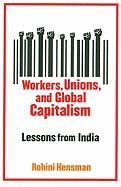 Author: Rohini Hensman
Author: Rohini Hensman
Publisher: Columbia University Press
Book Review by: Artha Hemrajani
Globalization has leveled the playing field for developing countries like China and India, for example, to compete for jobs with developed countries like the United States and Germany. Globalization is here to stay. It positively affects the developing world and negatively affects the developed world in the form of changes in the livelihood sources and lifestyles of tens, if not hundreds of millions of people around the world.
Essentially, the word ‘globalization’ immediately brings to mind the word ‘competition’. Globalization has helped employers in developing countries grow their companies while creating millions of jobs and speeding up the enlargement of the gross domestic product in their respective countries.
Competition in business has been around since the first human beings walked the earth. And trade between countries in the form of exchange of products or barter began several centuries ago, followed by actual sales wherein money was given for products received. Centuries later, money was paid by buyers in developed countries to sellers of services in developing countries.
My point in giving these several examples of trade, barter and sales between developed and developing nations is to demonstrate that these activities of commerce are as natural as other human activities.
So labor unions’ pleas on their governments to place protectionist barriers or bar free trade go against perfectly natural commercial activities.
In her Introduction to this book, Rohini Hensman writes about ‘the passionate proponents of de-globalization’ who “see globalization as synonymous with inequality and oppression and who advocate disabling the World Trade Organization, International Monetary Fund, World Bank and transnational corporations.” I do not believe any of that disabling will ever happen. (Italicizations are mine).
I had no idea there exists any person who dreams of an impractical and impossible goal as de-globalization, thereby eliminating competition, a phenomenon in nature itself. Competition is natural in all aspects of human life. Even non-human creatures compete to live. It is called survival of the fittest.
Global competition for people and the services they provide necessarily leads business owners and managers to search for good value propositions: desired levels of services coupled with desired price levels. The result has been that tens of millions of people in the United States and Europe have lost their jobs, while people in China, India and other countries in Asia and elsewhere have gained those jobs.
Losses of jobs are natural courses of events resulting from competition. If competition has caused ‘inequality’ and ‘oppression’ as displaced workers charge, it is not an individual or a committee that brought about those outcomes for workers in advanced economies. If members of labor unions cannot handle the adverse effects of globalization on them, they need to come up with creative solutions to their problems, including compromises on their wages and benefits, instead pining for ‘de-globalization’.
In her Conclusion, the author describes de-globalization as ‘a reactionary utopia.’ She writes: “Those who really oppose globalization could justifiably be seen as conservative or reactionary, attempting to hold still or roll back the wheel of history. To the extent that this opposition is successful, it retards the transition from imperialism to a world order marked by more egalitarian and peaceful relationships between peoples.”
“And even if unsuccessful, it distracts attention from the task of shaping the new global order, leaving the field open for advocates of traditional authoritarian labor relations and modern neo-liberal policies to impose their own agendas on it.”
So the warning “think of the consequences of what you want” is appropriate here.
While this book is essentially on defining globalization and its effects on developed and developing economies as well as on capital and labor, it discusses many relevant issues, such as workers’ struggles; the 2008 global crisis; trade union rights, informal labor, working women, employment creation and welfare, international strategies, and the need for global solidarity.
This is a well-researched book on the subject of global capitalism and workers’ rights for the student, professional or any reader interested in such issues. For further information on or research into a specific topic, there is provided for you an ample section of more than 50 pages of References.






